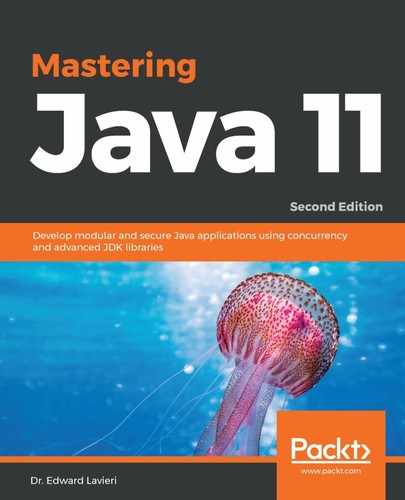By now, you have a firm appreciation of Java's modularization. An old adage in Java, and another object-oriented programming language, is everything is a class. Now, everything is a module is a new adage. There are three types of modules, as explained here:
| Module type | Description |
| Automatic | When a JAR is placed on a new module path, modules are automatically created. |
| Explicit/Named | These modules are manually defined by editing the module-info.java file. |
| Unnamed | When a JAR is placed on a classpath, unnamed modules are created. |
When you migrate your applications from 8 or earlier, your application and its libraries become unnamed modules. So, you will need to ensure all the modules are in the module path.
Another thing to be aware of is that your runtime image will not contain the entire JDK. Instead, it will only contain the modules your application requires. It is worth reviewing how the JDK is modularized in Java. The following table contains the API specification for the current JDK:
| jdk.accessibility | jdk.attach | jdk.charsets | jdk.compiler |
| jdk.crypto.cryptoki | jdk.crypto.ec | jdk.dynalink | jdk.editpad |
| jdk.hotspot.agent | jdk.httpserver | jdk.incubator.httpclient | jdk.jartool |
| jdk.javadoc | jdk.jcmd | jdk.jconsole | jdk.jdeps |
| jdk.jdi | jdk.jdwp.agent | jdk.jlink | jdk.jshell |
| jdk.jsobject | jdk.jstatd | jdk.localedata | jdk.management |
| jdk.management.agent | jdk.naming.dns | jdk.naming.rmi | jdk.net |
| jdk.pack | jdk.packager.services | jdk.policytool | jdk.rmic |
| jdk.scripting.nashorn | jdk.sctp | jdk.security.auth | jdk.security.jgss |
| jdk.snmp | jdk.xml.dom | jdk.zipfs |
The following table contains the API specification for Java SE:
| java.activation | java.base | java.compiler | java.corba |
| java.datatransfer | java.desktop | java.instrument | java.logging |
| java.management | java.management.rmi | java.naming | java.prefs |
| java.rmi | java.scripting | java.se | java.se.ee |
| java.security.jgss | java.security.sasl | java.sql | java.sql.rowset |
| java.transaction | java.xml | java.xml.bind | java.xml.crypto |
| java.xml.ws | java.xml.ws.annotation |
The following table contains the API specification for JavaFX in Java:
| javafx.base | javafx.controls | javafx.fxml | javafx.graphics |
| javafx.media | javafx.swing | javafx.web |
There are two additional modules:
- java.jnlp defines the API for JNLP (short for Java Network Launch Protocol).
- java.smartcardio defines the API for the Java smart card input/output.
